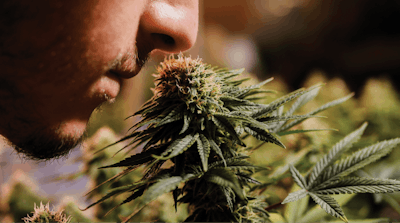

Hemp is an odoriferous crop. The odors in hemp are caused by terpenes, which are present in nearly all plants and are the primary ingredient in essential oils. A 2020 study reports more than 200 terpenes have been identified in the cannabis plant to date. The quantity and quality of the terpenes in hemp allow for the multitude of cultivars available in the smokable hemp market. Each variety of hemp (e.g., Sour Diesel, Hawaiian Haze, Skywalker) has its own terpene profile, which can differ dramatically from one variety to the next.
Regardless, nearly all hemp has a distinct and powerful odor that increases as the plant progresses through its lifecycle.
Not everyone enjoys the powerful smell of hemp. Although living near a hemp farm is in many cases less offensive odor-wise than living next to a poultry farm or feedlot, that doesn’t mean your neighbors won’t complain to you or their local government, or seek relief in court.
Hemp farmers by and large want to be good neighbors. But when growing outdoors, there isn’t a lot they can control regarding the odors emanating from their crops. However, some legal protections may be available to hemp farmers dealing with odor complaints. And farmers can take certain steps to prevent neighbor complaints or adverse action by a county land use board or zoning commission.
Right-to-Farm Laws
Every state has enacted some version of a “right-to-farm” law. The National Agricultural Law Center website has compiled these laws in an easy-to-use map, which you can find here. These laws typically declare that certain farm or forestry practices are critical to the state’s welfare and establish protections for farmers from lawsuits and local government restrictions related to activities arising out of these practices. Because each state has its own laws, you should consult with a legal professional in your state to understand what protections you may or may not have.
The overarching principle behind right-to-farm laws is to protect farmers from nuisance lawsuits. The common law system this country inherited from England long ago recognized “nuisance” as a claim upon which a person may base a lawsuit.
Nuisance claims may be brought against private individuals, companies and even the government. The underlying theory behind nuisance is that each person has a right to the peaceable use and enjoyment of his or her property. When someone unreasonably interferes with that right, a person may seek to stop the activity by filing a nuisance lawsuit. A plaintiff in a nuisance lawsuit may seek monetary damages as well as a court order enjoining the offending party from engaging in the activity deemed a nuisance. In plain language, this might mean a court issues an injunction ordering a hemp farmer to stop cultivating hemp.
Right-to-farm laws typically prohibit nuisance lawsuits against farmers for agricultural activities. Here in Oregon, where my office is located, the law defines “farm” to include “any facility, including the land, buildings, watercourses and appurtenances thereto, used in the commercial production of crops, nursery stock, livestock, poultry, livestock products, poultry products, vermiculture product or the propagation and raising of nursery stock.” The Oregon right-to-farm law protects farmers where (i) the farming practice is used on farms of a similar nature, (ii) the farmer uses generally accepted, reasonable, and prudent methods, and (iii) the farm complies with applicable laws. In Oregon, a farmer protected by the right-to-farm law is not only immune from private nuisance lawsuits but also protected from changes to local government or district ordinances or regulations. Notably, the prevailing party in a lawsuit may recover its attorneys’ fees.
Taking Oregon as an example, then, right-to-farm laws provide farmers powerful protections. Hemp farmers should note that many states require farming operations to have been in effect for at least one year before protections apply (e.g., North Dakota). Another important factor to consider is whether the protections in your state extend to real property not zoned for agricultural use as well as the land borders. Certain protections may also be subject to specific state laws governing agricultural uses and nuisance, which in some cases may override the state’s more general right-to-farm law.
Right-to-farm laws are not without controversy. The laws were enacted or expanded in some jurisdictions as the result of significant lobbying efforts by large-scale industrial agriculture—think concentrated animal feeding operations (CAFOs) and other types of intensive feedlots, poultry farms, etc. Nonetheless, these laws provide farmers with significant benefits.
How Right-to-Farm Laws Protect Hemp Farmers From Noxious Odor Lawsuits
After the enactment of the Agriculture Improvement Act of 2018 (the 2018 Farm Bill), hemp became an ordinary agricultural crop for most intents and purposes (though it’s one that is subject to much stricter regulation than tomatoes). Accordingly, hemp farmers generally ought to be (or are) entitled to the protection of their state’s right-to-farm law. The Oregon Department of Agriculture, for example, has stood on the side of hemp farmers in the face of proposed county regulations that would have limited where farmers could grow hemp, according to Capital Press.
Where a hemp farmer is entitled to right-to-farm protections, he or she may be immune from a lawsuit for a claim that its agricultural product is causing a nuisance. Again, this is an area of law that depends very much on your state’s right-to-farm laws, zoning regulations, and whether your hemp farm may cause an adverse effect on another neighbor’s farming operations.
How to Avoid Problems in the First Place
Regardless of the protections offered by right-to-farm laws, it is in hemp farmers’ best interest to avoid conflicts in the first place. One of the best ways to do this is to keep open your lines of communication with neighbors. Talk early and often: Explain the growing cycle and time period for the odors; what steps you are taking, if any, to minimize any odor issues; and your use of reasonable and best practices. Also, take into account that your right to farm does not give you the right to interfere with your neighbors’ farm operations. Such interference can take many forms, such as pesticide run-off or other activities that substantially affect nearby farming operations. Some states have a carve-out in right-to-farm laws for damage caused to other commercial agricultural operations; others, like Indiana, do not. If the conflict cannot be avoided or mitigated, consider negotiating an odor control agreement with your neighbors and land-use authorities, as greenhouse cannabis growers have done in Carpinteria, Calif., according to Santa Barbara Independent. The agreement includes the installation of the “best available odor control technologies.” These kinds of agreements are intended as a compromise between farmers and neighbors with the goal of allowing peaceable co-existence and minimizing lawsuits.
Farmers who lease land for growing hemp should note that a landlord may impose odor control agreements in a lease. Negotiating and drafting an odor agreement may take months or years to develop, though that may be preferable to extended legal battles and confrontations in your community with your neighbors. Outdoor growers may want to consider whether the cultivar they plant is known as odoriferous and whether they can mitigate the odors to any extent by planting other crops with a strong but different smell (e.g., lavender, lemongrass or rosemary).
















